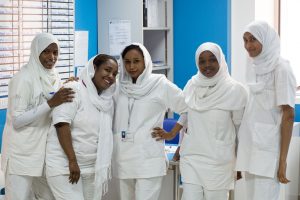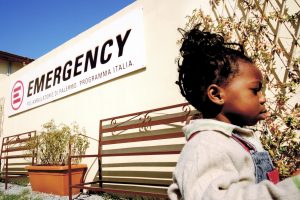What We Do
EMERGENCY provides free, high-quality healthcare to victims of war, poverty and landmines, alongside building hospitals and training local medical staff. Founded in 1994, EMERGENCY has worked in 21 different countries and currently operates in Afghanistan, Eritrea, Iraq, Italy, Palestine, Sierra Leone, Sudan, Uganda and Ukraine.
We Provide Free, High-Quality Medical and Surgical Care
We provide healthcare to those who would have little or no access to it otherwise: those most in need. We believe that everyone should have access to life-saving treatment, which is why the medical care that we provide is always free-of-charge and of the highest standard. We don’t discriminate: we guarantee treatment to anyone that needs it regardless of their religion, ethnicity, gender, background or political opinion. Our approach goes beyond the provision of only primary healthcare:
Areas of Intervention
- Paediatric and adult cardiac surgery
- Surgery for victims of war and landmines
- Emergency and trauma surgery
- General surgery
- Orthopaedic surgery
- First aid
- Cardiology
- Primary health care
- Internal medicine
- Neonatology
- Ophthalmology
- Obstetrics and gynaecology
- Paediatrics
- Dentistry
- Rehabilitation
- Physiotherapy
- Production of prostheses and orthoses
- Vocational training and setting up of small business cooperatives for people with disabilities and those from disadvantaged social groups
We Build Healthcare Facilities
We build and renovate healthcare facilities in countries affected by conflict, whose health systems have often been weakened by war and lack of investment. We want to sustainably contribute to the livelihoods of local communities by helping to rebuild local healthcare infrastructure. That’s why we transfer complete control of our facilities to local health authorities once they achieve operational independence.
- Hospitals specifically dedicated to war victims and surgical emergencies;
- Physical and social rehabilitation centres;
- First aid posts for emergency treatment and referral of patients to our surgical centres;
- Healthcare centres for primary medical assistance;
- Paediatric clinics;
- Maternity centres;
- Outpatient clinics and mobile clinics for migrants and people in need;
- Centres of medical excellence.
We Train Medical Staff and Support Local Communities

In our hospitals we give great importance to the training of local doctors, nurses, and midwives. For us, providing sustainable healthcare means training medical and non-medical staff who can continue to provide free, high-quality healthcare after we leave. Our objective is to hand over our hospitals to national staff and authorities once they become self-sustaining. That’s why EMERGENCY employs local people, those with disabilities or from disadvantaged social groups in particular, in every hospital and clinic. We also run vocational training programmes for individuals who have been injured or left without social and financial support due to war.
EMERGENCY impacts the communities where it works in multiple ways. By building hospitals and training medical staff, we create sustainable healthcare infrastructures that will continue to function once we hand over our projects to national staff and local authorities. This approach helps to contribute to the strengthening of national healthcare systems and to the empowerment of local individuals.
We also reach vulnerable communities who would otherwise have no access to healthcare. Our patients include those who have been injured by war, those who have fled from war and those who are too poor to pay for private healthcare – which is often the only option available in low-income countries and in countries affected by or recovering from conflict.
We Promote a Culture of Peace

Every day EMERGENCY deals with the destruction and suffering caused by war. For this reason, EMERGENCY has always been committed to promoting a culture of peace not only in the countries where our medical and surgical projects are based, but everywhere in the world.
In 1994 EMERGENCY led a campaign against antipersonnel landmines, which led to the Italian government’s prohibition of their construction in Italy. In 2002 EMERGENCY, together with other organisations, launched a campaign against the imminent invasion of Iraq, and did the same in 2001 against the war in Afghanistan. And everyday through our work we promote peace, by speaking out against war and by declaring our facilities weapon-free zones.
We reject the use of violence, terrorism and war as instruments to resolve disputes between individuals, peoples and nations. We want a world based on social justice, solidarity, reciprocal respect, dialogue, and on the equal distribution of resources.
